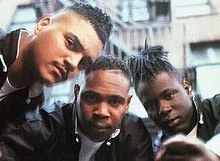- Fu-Schnickens
-
Fu-Schnickens 
Background information Origin East Flatbush, Brooklyn Genres Hip hop Instruments rapping Years active 1991–1996 Labels Jive Records Associated acts A Tribe Called Quest, Shaquille O'Neal Members Roderick Roachford (a.k.a. Chip Fu)
Joseph A. Jones (a.k.a. Moc Fu)
Lennox Maturine (a.k.a. Poc Fu)Fu-Schnickens was an American hip-hop trio. Similar to Das EFX for their cartoonish lyrics and near-constant allusions to pop culture staples, they were the first Hip Hop artists to rap in backwards fashion.[1] The Fu-Schnickens' popularity was brief but significant in hip hop history. Their best known track is 1993's "What's Up Doc? (Can We Rock)," featuring basketball star Shaquille O'Neal.
Contents
History
Career
The Fu-Schnickens comprised Chip Fu (Roderick Roachford), Moc Fu (Joe Jones), and Poc Fu (Lennox Maturine). "Fu" stood for "For Unity" and "Schnicken" was a made-up word which meant "coalition".[1] The three friends from East Flatbush, Brooklyn first gained attention after performing at a rap event at Howard University, after which they were signed by Jive Records.[1] The group's debut single, "Ring the Alarm," hit the top ten on the Billboard Hot Rap Tracks chart in 1992,[2] which sparking anticipation for the group's debut album F.U. Don't Take It Personal and also inadvertently immortalized and ignited a new-found popularity for the original "Ring The Alarm", the signature tune of Reggae/Dancehall singjay Tenor Saw from 1985, which they sampled to create their track of the same name. Furthermore, with the hit singles, "La Schmoove" (featuring Phife Dawg of A Tribe Called Quest) and "True Fu-Schnick", the album reached the Top 20 in the Top R&B/Hip-Hop Albums chart [1][2] and was certified gold by the RIAA.[3]
In 1993, the Fu-Schnickens began work on their second album. They recorded a fast-paced song called "What's Up Doc?" which featured a sample of Bugs Bunny saying his famous catchphrase. But they could not get sample clearance from Warner Bros so they shelved the song. Meanwhile, the then-rookie NBA star Shaquille O'Neal was a media sensation. In many interviews, he talked about his love of hip-hop music and stated that the Fu-Schnickens were his favorite rap group. This prompted the group to contact O'Neal for a collaboration. O'Neal recorded a verse that was added on to the already-recorded "What's Up Doc?" with the group and O'Neal saying "What's up, doc?" to replace the Bugs Bunny sample. Although, the group had not yet completed work on their album, the song was quickly released as a single to capitalize on O'Neal's popularity. The single was a Top 40 hit in the summer of 1993,[2] briefly propelling the group into the mainstream.[1] The group's second album, Nervous Breakdown, did not arrive until 1994, by which time the rap landscape had dramatically changed, and there was no longer an audience for their unique style.
The Fu took part in a huge performance on the finale of The Arsenio Hall Show, alongside the likes of KRS-One, the Wu-Tang Clan, Naughty By Nature, MC Lyte, Guru, Mad Lion, Yo-Yo, Das EFX, CL Smooth & A Tribe Called Quest.
The Fu-Schnickens are also notable for their many references to martial arts films and Asian culture before the Wu-Tang Clan,[1] who eventually helped make such references popular in hip-hop music.
Chip-Fu is currently working on a solo album.
Discography
Albums
- F.U. Don't Take It Personal (1992)
- Nervous Breakdown (1994)
- Greatest Hits (1995)
(Note: "Greatest Hits" included 4 previously unreleased songs: "Cray-Z", "Original Rude Boy", "Voice of the Ghetto" and "Bring it Back")
Singles
- "Ring the Alarm" (1991)
- "La Schmoove" (1992)
- "True Fu-Schnick" (1992)
- "What's Up Doc? (Can We Rock)" (1993)
- "Breakdown" (1994)
- "Sum Dum Munkey" (1995)
References
- ^ a b c d e f Huey, Steve. "Fu-Schnickens: Biography". allmusic. http://www.allmusic.com/artist/p26098. Retrieved 2009-07-18.
- ^ a b c "Fu-Schnickens: Charts & Awards". allmusic. http://www.allmusic.com/artist/p26098. Retrieved 2009-07-18.
- ^ "American album certifications – Fu-Schnickens – Take It Personally". Recording Industry Association of America. http://www.riaa.com/goldandplatinumdata.php?artist=%22Take+It+Personally%22. If necessary, click Advanced, then click Format, then select Album, then click SEARCH
External links
Categories:- African American musical groups
- American hip hop groups
- People from Brooklyn
Wikimedia Foundation. 2010.
